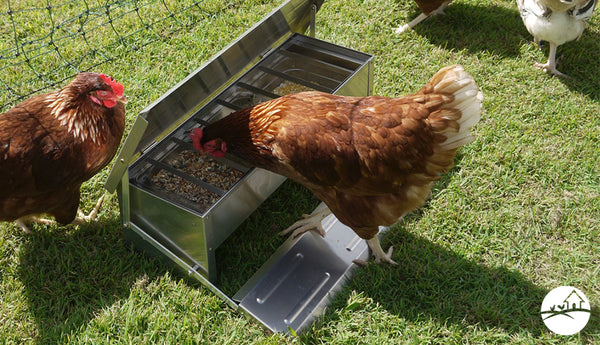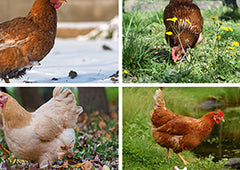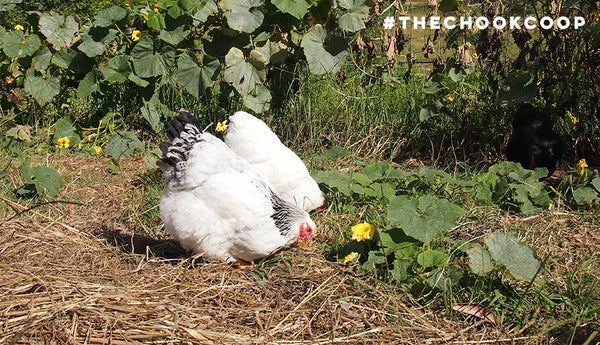When it comes to what do chickens eat, different seasons means different nutritional requirements for our glorious girls. Just like humans gravitating towards comfort foods and wanting different treats in Summer and Winter, chickens change their diet to match the changing weather. So, before you ask what do chickens eat- wonder no more! Here’s a guide to what do chickens eat across the seasons.
Note: All of these are in conjunction with normal layer feed and shell grit
What Do Chickens Eat In Summer?
If you’re in the top end of Australia, then you’ll be egg-speriencing some pretty crazy heat temps! When the temperature is hot, the most crucial requirement that a chicken has is FRESH WATER. Drinking fresh water is the best way chickens can keep themselves cool, and in the hot weather they can dehydrate quickly!
Chickens have a tendency to not eat as much if they’re feeling reeeally hot under the feather, so it’s important to keep encouraging them to eat through some healthy treats- you’ll be their favourite human without a doubt! Frozen berries, melons and some cold yoghurt are great ideas to give your girls some necessary nutrients and keep them cool.
So, what do chickens eat in summer?
-
Fresh, cool water
-
Yoghurt
What Do Chickens Eat In Autumn?
Autumn generally means moulting season for most chickens! If you’ve noticed your hens looking a little bare in the feather department, they’re probably moulting their feathers to grow some shiny, schmick new ones! This will happen for most chickens between March-May. During this time, it’s really important that your chickens are getting enough protein and calcium in their diet (as they’ll need it to grow their new feathers!) If you haven’t already, incorporate some shell grit into the chicken’s diet, as well as some other good sources of protein - yoghurt, scrambled eggs (unless you find that a cannibalistic!), mealworms and insects (freshly pecked off the garden) are all great sources of protein to keep your girls healthy and their feathers flourishing!
So, what do chickens eat in Autumn?
-
Egg-stra calcium for moulting hens (shell grit, crushed egg shells)
-
Protein-rich treats - yoghurt, cooked eggs, mealworms, insects
What Do Chickens Eat In Winter?
If you live in an area where the temperature plummets in winter, there are definitely some warming foods you can give your girls to ensure they are able to weather the elements with ease.
Again, fresh water is always important - many chickens don’t get enough because their water supply freezes without their owner’s knowledge! So ensure their water stays fresh, not frozen.
When the temperature is cold, chickens will also consume more feed (just like humans tend to consume more hearty meals to keep warm!), so keep in mind you might have to dish out a little egg-stra at dinner time.
Some warming treats you can feed your flock to keep them healthy and happy include warm porridge (made with water, not milk), and you can also warm up their normal lay mash!
So, what do chickens eat in winter?
-
Fresh water (make sure it’s not frozen!)
-
Warm porridge (made with water)
-
Egg-stra serves of feed
-
Warmed up feed
What Do Chickens Eat In Spring?
Spring has sprung for our beautiful chickens, which generally means the return of a bounty of fresh eggs after the winter hiatus! During this time, it’s important to give your girls the calcium they need to lay strong-shelled eggs - so a decent diet of calcium rich-foods is very important for your girls!
If the weather starts getting warm again, re-introduce the frozen treats.
So, what do chickens eat in spring?
-
Re-introduce shell grit once your girls start laying
-
Frozen treats if it’s warm!
So if you’re scratching your head asking what do chickens eat in Summer, Autumn, Winter or Spring, wonder no longer! Your girls will always eat their standard layer feed all year round, but the egg-stra treats and nutrition boosts you can give them from season to season will keep them in tip top shape!
As well as seasonal treats, there are lots of things to consider when looking after your chooks throughout the seasons. Come rain or shine, something we’ll never be able to control is the weather! It can be a worry and concern when thinking about the safety and comfort of your backyard friends.
Cluckily, you can prepare for all seasons thanks to our friends over at Chickenpedia. I recommend their brilliant Weatherproof Chickens course to all my readers! They have compiled a guide of everything you need to keep healthy chickens through the seasons (which is more than you think!) with a great set of checklists and downloads to keep. Dangerous conditions including dehydration and frostbite can be avoided with the correct information and actions. Whatever the weather, this course will help you keep your chickens happy and healthy all year round.
As chicken keepers, we want to do an eggcellent job when caring for our feathered friends. Many chicken keepers struggle to handle chicken health or behaviour issues, especially in the first few years of having a flock. Chickenpedia have comprehensive online courses on everything you didn’t know you need to know and then some more! From healthcare to raising baby chicks to feeding and behavior, you’ll find beginner-friendly courses that’ll give you the knowledge and confidence to successfully look after your chickens.
As a member, you will get access to ALL their fantastic courses. No need to wing it, become the ultimate chicken eggspert! Check out Chickenpedia and their amazing courses today!
Of course, the best protection you can give your chickens across the seasons and the changes in weather is a well ventilated coop! A good coop will keep your flock warm in winter, and cool in summer - the Taj Mahal, Penthouse and Mansion are all designed with optimal ventilation in mind, so your flock will be well protected.



















